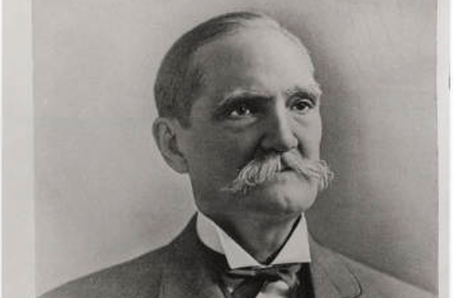 Tomás Estrada Palma (1835-1908), the first president of an independent Cuba, 1902-1906. Born near Bayamo, July 9, he attended schools in Havana and the University of Seville, from where family matters forced his return before graduation. As soon as the Ten Years’ War broke out, he joined the rebels. In 1876 he was elected president of the provisional government, but in 1877 he was captured and imprisoned in Figueras, Spain, for the rest of the war. On release he traveled to Paris, New York, and Honduras, where he married Genoveva Guardiola and served President Soto as postmaster general, 1878-1883. He then moved to Orange County, New York, where he acquired U.S. citizenship, became a Quaker, and opened a boy’s school. Teaching soon gave way to politics when he was visited by José Martí. When Martí was killed in Dos Rios, Estrada was named delegate-in-exile to the rebel’s congress and head of the Junta Central Republicana de Cuba y Puerto Rico in New York, carrying out diplomatic relations (primarily with the United States), raising funds and promoting the Cuban cause. In 1901 he was elected president by an overwhelming majority. The new president encouraged foreign investment and Cuban exports. He continued and expanded public and educational projects initiated during the first United States intervention and negotiated with the United States the Reciprocity Treaty of 1903 and the Hay-Quesada Treaty of 1904.
Tomás Estrada Palma (1835-1908), the first president of an independent Cuba, 1902-1906. Born near Bayamo, July 9, he attended schools in Havana and the University of Seville, from where family matters forced his return before graduation. As soon as the Ten Years’ War broke out, he joined the rebels. In 1876 he was elected president of the provisional government, but in 1877 he was captured and imprisoned in Figueras, Spain, for the rest of the war. On release he traveled to Paris, New York, and Honduras, where he married Genoveva Guardiola and served President Soto as postmaster general, 1878-1883. He then moved to Orange County, New York, where he acquired U.S. citizenship, became a Quaker, and opened a boy’s school. Teaching soon gave way to politics when he was visited by José Martí. When Martí was killed in Dos Rios, Estrada was named delegate-in-exile to the rebel’s congress and head of the Junta Central Republicana de Cuba y Puerto Rico in New York, carrying out diplomatic relations (primarily with the United States), raising funds and promoting the Cuban cause. In 1901 he was elected president by an overwhelming majority. The new president encouraged foreign investment and Cuban exports. He continued and expanded public and educational projects initiated during the first United States intervention and negotiated with the United States the Reciprocity Treaty of 1903 and the Hay-Quesada Treaty of 1904.
He had less success in domestic politics. Popular and well intentioned, he conducted an honest and paternalistic government above partisan politics, but, with little faith in his compatriots’ ability to govern themselves, he purged unfriendly office holders and resorted to other questionable methods to secure his own reelection (as the Partido Moderado candidate). He was returned unopposed in the election of 1905 when the opposition Partido Liberal withdrew, charging the administration with fraud. In August 1906 a Liberal uprising began in Pinar del Rio province, and quickly spread islandwide as the Guerrita de Agosto. When United States assistance was sought, Secretary of War William Taft proposed the annulment of the whole election, except that of the president and vice-president. A bitterly disappointed Estrada rejected this and resigned, September 1906, retiring quietly to his modest holding in Bayamo, where he died on November 4, two years later.
Jaime Suchlicki is Director of the Cuban Studies Institute, CSI, a non-profit research group in Coral Gables, FL. He is the author of Cuba: From Columbus to Castro & Beyond, now in its 5th edition; Mexico: From Montezuma to the Rise of the PAN, 2nd edition, and of the recently published Breve Historia de Cuba.








